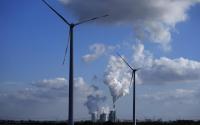22 June 2006
Global warming accounted for about half of the extra hurricane-fueling warmth in Atlantic waters off the United States in 2005, while natural cycles were smaller factors, according to a study released Thursday by the National Center for Atmospheric Research.
"The global warming influence provides a new background level that increases the risk of future enhancements in hurricane activity," co-author Kevin Trenberth wrote in the study.
A statement issued by the center said that the study "contradicts recent claims that natural cycles are responsible for the upturn in Atlantic hurricane activity since 1995. It also adds support to the premise that hurricane seasons will become more active as global temperatures rise."
While researchers agree that the warming waters fuel hurricane intensity, they have been uncertain whether Atlantic waters have warmed because of a natural, decades-long cycle, or because of longer-term global warming.
The study found that during much of last year's hurricane season, which runs from June 1 to Nov. 30, sea-surface temperatures in Atlantic waters where many hurricanes form were a record 1.7 degrees F above the 1901-1970 average.
Comparing the Atlantic data to worldwide data since the early 20th century, the researchers calculated that global warming explained about 0.8 degrees of this rise.
Click for related content |
The 2004-05 El Nino ocean cycle accounted for about 0.4 degrees, they calculated, while the 60-80 year natural cycle was thought to explain less than 0.2 degrees of the increase, according to Trenberth. The remainder is due to year-to-year variability in temperatures.
The center said the researchers "subtracted the global trend from the irregular Atlantic temperatures — in effect, separating global warming from the Atlantic natural cycle."
The results show that the 60-80 year natural cycle "is actually much weaker now than it was in the 1950s, when Atlantic hurricanes were also quite active," the center said.
The researchers stressed that global warming does not guarantee that each year will set records for hurricanes, noting that last year's record was due also to upper-level winds that contributed to hurricane formation.
The study by Trenberth and colleague Dennis Shea will appear in the June 27 issue of Geophysical Research Letters, published by the American Geophysical Union.
The National Center for Atmospheric Research is primarily sponsored by a consortium of universities and the National Science Foundation.






